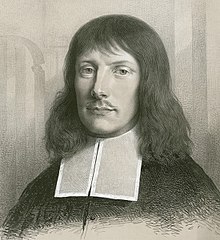BWV 120a
|
Herr Gott, Beherrscher aller Dinge BWV 120a |
|
|---|---|
| Wedding cantata by J. S. Bach | |

Joachim Neander, author of the chorale text
|
Herr Gott, Beherrscher aller Dinge (Lord God, ruler of all things),BWV 120a, is a wedding cantata by Johann Sebastian Bach. He composed and first performed it in Leipzig, most likely in 1729.
Bach composed the cantata for a wedding in Leipzig probably in 1729, "in great haste", according to Klaus Hofmann, looking at Bach's handwriting and mistakes made by the copiers. The music is generally agreed to be of high quality. Bach adapted the opening chorus for the Et expecto resurrectionem mortuorum section of the Mass in B minor, a composition which is widely hailed as one of the greatest in musical history.
The music survives in an incomplete state. There is a fragmentary autograph score and some parts written by various scribes: only the vocal parts, a viola part and three continuo parts are extant. As the cantata shares music with other compositions, particularly BWV 120 (believed to be a later work), but also BWV 1006 and BWV 137 (two earlier works), it can be reconstructed. On this basis, the instruments can be assumed to be those specified in the other works including oboes d'amore, trumpets and timpani.
The names of bride and groom are not known. He has been assumed to be a minister of religion, deducted from the text "Herr, fange an, und gib den Segen / auf dieses deines Dieners Haus" (Lord, begin and pronounce your blessing / on this, your servant's house).
The text was written by an anonymous poet. It is in two parts, the second one marked Post copulationem (after the wedding ceremony). The closing chorale is by Joachim Neander, stanzas 4 and 5 of his hymn "Lobe den Herren, den mächtigen König der Ehren".
...
Wikipedia
